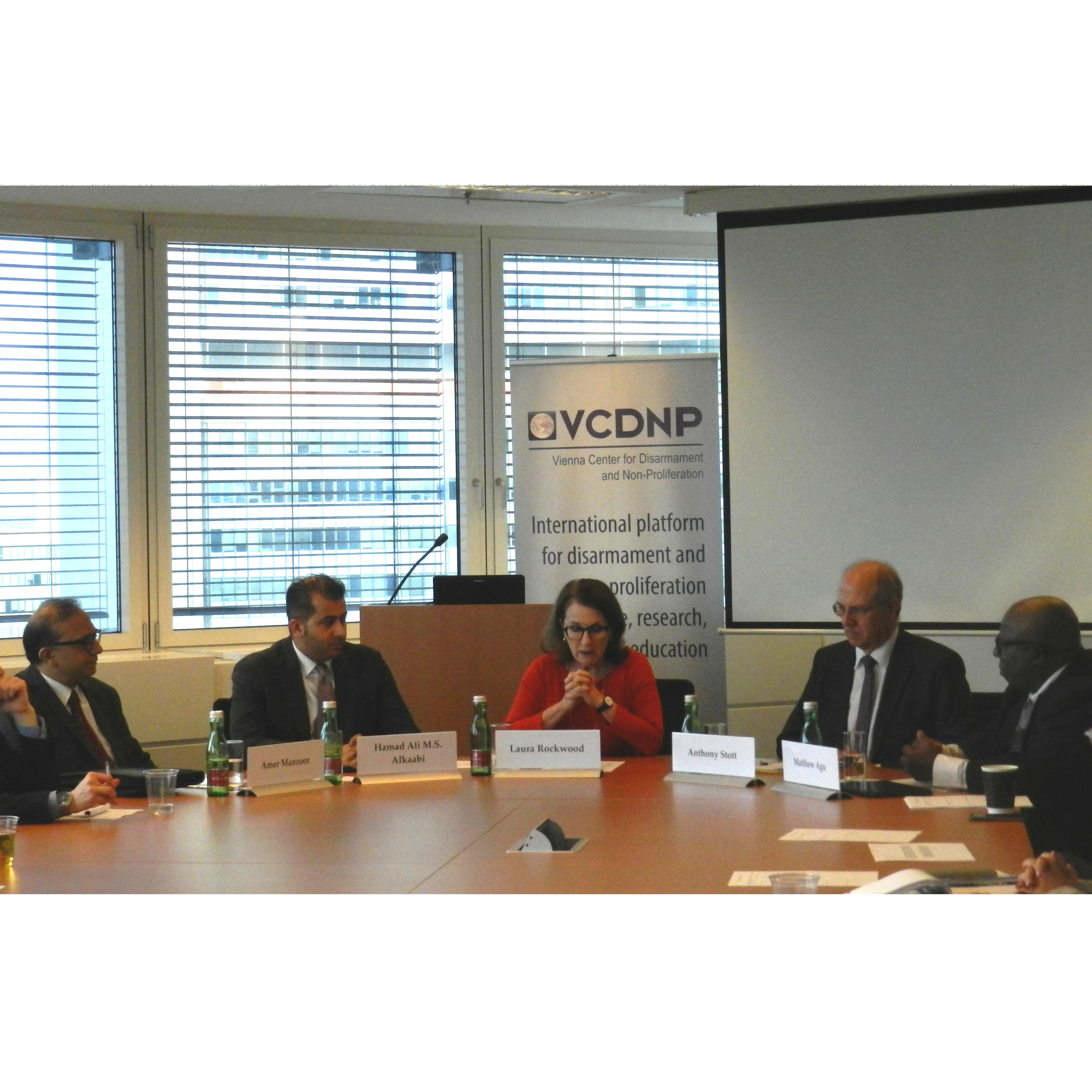
On 20 February 2019, the VCDNP organised a panel discussion with support from the International Science and Technology Center (ISTC) in Kazakhstan on the “Safe and Secure Use of Nuclear Power to Provide Reliable, Affordable and Sustainable Energy for All”.
The panel comprised experts from the United Arab Emirates (UAE), Pakistan, Nigeria and the International Atomic Energy Agency (IAEA). Speakers discussed various aspects of planning for a nuclear power programme and producing nuclear power including the importance of creating an “enabling environment” domestically, the role of safety and security, as well as the challenges they faced and how those challenges were addressed. The panel also focussed on the role of the IAEA and its support to its Member States. The full report on the panel discussion is available here. Links to the presentations and useful IAEA booklets are included in the report for ease of reference.
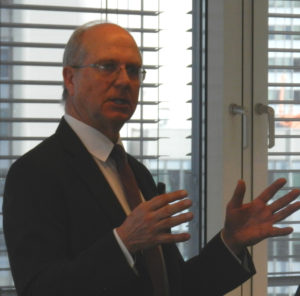
Mr. Anthony Stott, an international consultant on nuclear power infrastructure development, and currently the operational lead in the Nuclear Infrastructure Development Section of the IAEA Division of Nuclear Power, provided an overview of the IAEA’s support to its Member States.
The Milestones Approach of the IAEA provides a comprehensive guidance framework for the development of infrastructure for nuclear power programmes, considering 19 specific infrastructure issues, three phases and three milestones. Nuclear safety, security, safeguards, developing a legal framework, human resource development, funding and financing are among the 19 infrastructure issues. The IAEA’s Integrated Nuclear Infrastructure Review (INIR) methodology describes, for each infrastructure issue, conditions that should be met to achieve the milestone in the specific phase.
Addressing the contribution of nuclear power to sustainable development and climate change mitigation, Mr. Stott noted that universal access to affordable, reliable and modern energy– Sustainable Development Goal (SDG)7 – is central to achieving all 17 SDGs. Nuclear power, measured against the three pillars of sustainable development i.e. economic, environmental and social, is a reliable, climate neutral source of power that can play a role in energy supply diversification and foster a more resilient power supply. He emphasised that the highest standards of nuclear safety, security and safeguards have to be maintained when using nuclear power.
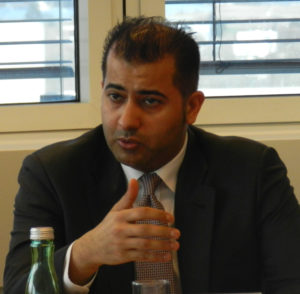
Ambassador Alkaabi, Permanent Representative of the United Arab Emirates (UAE) in Vienna and the UAE's Special Representative for International Nuclear Cooperation briefed the meeting on the UAE’s nuclear power programme. Being a net importer of natural gas the UAE decided in 2007 to develop nuclear power to meet its electricity demands. A high-level strategy was established with the following principles: Maintain high operational transparency; the highest standards of nuclear safety, security and non-proliferation; work closely with the IAEA; benefit from the expertise of others; and ensure long-term sustainability.
The UAE has made a massive investment in human capacity development and considers on the job training as an essential, ongoing investment. Ambassador Alkaabi described the UAE’s strategy (please see the full report of the panel discussion) to bring the nuclear power programme to fruition in the most effective and efficient manner resulting in four nuclear reactors today being in an advanced stage of construction. The IAEA conducted an INIR Phase 2 mission in the UAE in 2011 and an INIR Phase 3 mission in 2018. The UAE has completed ten major review missions in the last ten years, which have proved very useful according to Ambassador Alkaabi.
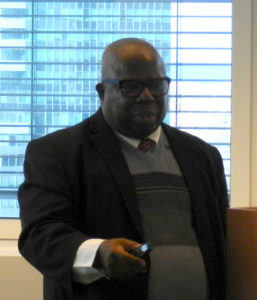
Professor Matthew Agu is the Project Manager: Nuclear Power at the Nigeria Energy Commission and gave a briefing on Nigeria’s experience with nuclear power. Nigeria made the decision in 2005 to introduce nuclear power into its energy mix. Professor Agu explained that the target date for building a reactor had been 2025, but this turned out to be unfeasible. The goal is currently to produce nuclear power by 2030.
Professor Agu explained that nuclear power development was hampered in Nigeria because programme execution did not follow a clearly defined roadmap. As a result implementation by various government agencies were not properly coordinated. Furthermore, the nuclear roadmap has stringent timelines for sustainable and successful implementation, but challenges in Nigeria, including funding, legal framework development and human resources development, have slowed down programme implementation. Professor Agu emphasised the importance of human resource development and pointed out that Nigeria had underestimated the amount of time it would take to train the large number of people needed to implement a nuclear power programme. The IAEA played an important part in assisting Nigeria to address some of these challenges.
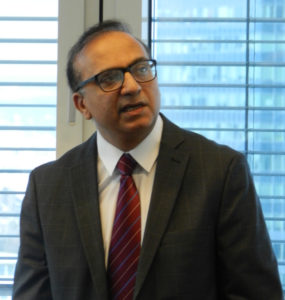
Mr. Amer Manzoor, Minister (Technical) at the Permanent Mission of Pakistan to the United Nations in Vienna, previously the Director of the Project Management Department for the nuclear power projects of Pakistan at the corporate office of Pakistan Atomic Energy Commission, shared Pakistan’s experience with nuclear power production. At present five nuclear power plants (NPPs) are in operation while another two new plants are under construction in Pakistan.
Like the other panellists Mr. Manzoor emphasised the importance of having enough trained and experienced people for a successful nuclear power programme. He also stated that strong commitment of the government to the nuclear power programme was essential to the success and long-term sustainability of programme. In terms of safety and security Pakistan has operated power plants (for 45 years) and radiological facilities, which include research reactors, agriculture and medical centres, safely and securely. All of Pakistan's nuclear power plants are under IAEA safeguards. The IAEA has provided support to Pakistan for physical protection upgrades for its radiological facilities, as well as its nuclear power facilities. Pakistan is indigenising its nuclear power programme by integrating the local industry in its endeavour and ensuring development of the necessary industrial infrastructure to support this initiative. The IAEA is also providing support in this regard.
All the panellists emphasised the importance of transparency and engagement with the public. Regarding a question on post-Fukushima modifications by the IAEA and the countries represented by the panellists, Mr. Stott explained that the IAEA produced a comprehensive report on the Fukushima-Daiichi accident (with five technical volumes) that includes lessons learned that can be acted upon by governments, regulators and NPP operators.
There was also a discussion on whether private owned power plants were more successful than state owned plants and what the criteria is for choosing a supplier. Mr. Stott noted that all the NPPs in newcomer countries are State-driven. Regarding the differences between vendors he noted that all major nuclear reactor vendors offer safe technology and their designs meet current requirements. Mr. Stott emphasised that newcomer countries also look at the financial packages available and support for their human resource capabilities, which are more of a deciding factor than the technology provided.
The panellists emphasised the importance of maintaining the highest standards of nuclear safety, security and safeguards and during the discussion also spoke to the importance of the interface between these specialised areas. Ambassador Alkaabi noted that it does not matter who the implementers are, the interface has to be right. There are various nuclear safety and security stakeholders but communication between these stakeholders is important to ensure that they are not operating in silos. Mr. Manzoor noted that, in Pakistan, nuclear safety, security and safeguards are kept separate. However, there is a higher body, the national command authority headed by the Prime Minister, where all the stakeholders are represented and where decisions are taken.
Nuclear power can play a role in energy supply diversification and foster a more resilient power supply. Embarking on nuclear power however requires at least a 100-year commitment by a country. All the panellists emphasised that to bring a programme to fruition the following was essential: strong national leadership and commitment; drawing on the experiences and expertise of other countries; working closely with the IAEA; human resource development; and maintaining the highest standards of nuclear safety, security and safeguards. Please read the full report here.




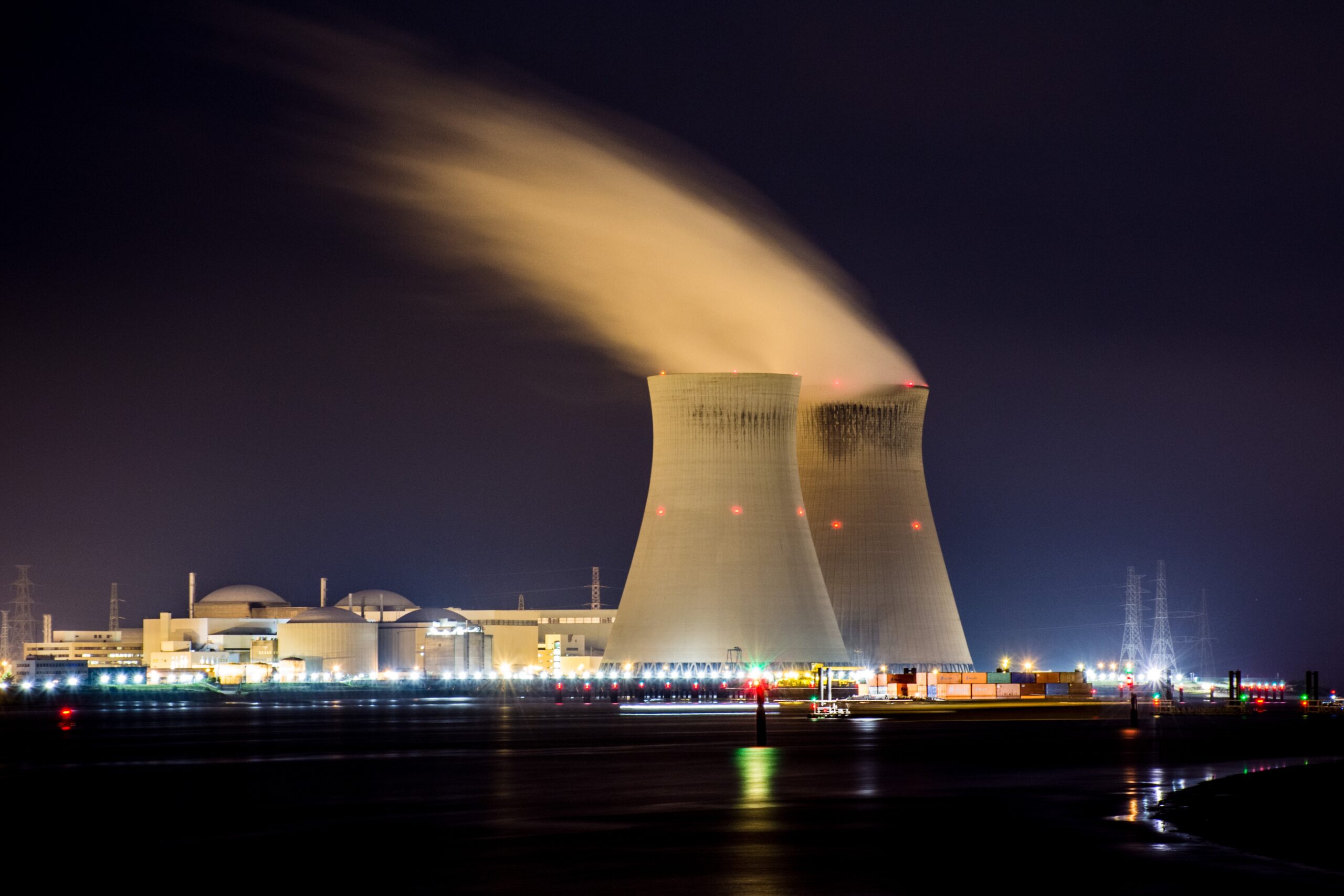
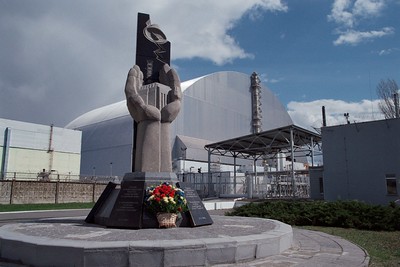
By continuing to use the site, you agree to the use of cookies. more information
The cookie settings on this website are set to "allow cookies" to give you the best browsing experience possible. If you continue to use this website without changing your cookie settings or you click "Accept" below then you are consenting to this.